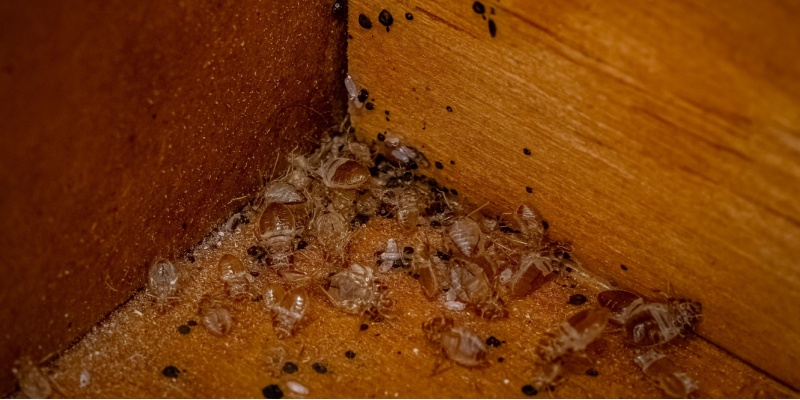Discovering a bed bug infestation in your home can be alarming and perplexing. These tiny pests are notorious for their ability to sneak into homes undetected, leading many to wonder how they ended up with a bed bug problem. Understanding the common ways bed bugs can enter and spread in your home can help you take preventive measures and address the issue more effectively. Here’s a comprehensive look at how bed bug infestations typically start and spread:
Travel-Related Introductions
- Hotels and Motels: One of the most common ways bed bugs are introduced into homes is through travel. Bed bugs are adept hitchhikers and can easily be picked up from infested hotels, motels, or other lodging. They often hide in luggage, clothing, or personal belongings and travel with you back home.
- Public Transportation: Public transportation, including buses, trains, and rideshare vehicles, can also be a source of bed bugs. They may hitch a ride on clothing or bags and subsequently find their way into your home.
Secondhand Furniture and Items
- Used Furniture: Buying or receiving secondhand furniture, especially items like mattresses, box springs, or upholstered chairs, can introduce bed bugs into your home. Bed bugs can easily hide in the seams and crevices of furniture, making them difficult to detect.
- Thrift Stores and Garage Sales: Items purchased from thrift stores, garage sales, or flea markets may carry bed bugs. Since these items are often not thoroughly inspected or treated for pests, they can unknowingly bring bed bugs into your home.
Neighboring Infestations
- Multi-Unit Buildings: In apartment complexes, condos, or other multi-unit buildings, bed bugs can easily spread from one unit to another. If a neighboring unit has an infestation, bed bugs can migrate through walls, plumbing, or electrical conduits and eventually invade your home.
- Shared Walls and Structures: Bed bugs can travel between connected spaces through shared walls and structural voids. Even if your home is not directly infested, bed bugs from adjacent or nearby properties can find their way into your living space.
Improper Handling and Disposal
- Improper Disposal of Infested Items: If you discard infested items like mattresses or furniture without properly treating or disposing of them, you risk spreading bed bugs to other areas. Bed bugs can hitch a ride on discarded items and infest new locations.
- Moving Infested Items: Moving infested belongings from one location to another without proper treatment can spread bed bugs. To prevent the spread of an infestation, it’s essential to inspect and treat items before relocating them.
Bringing Bed Bugs Home from Work or School
- Shared Spaces: Workplaces, schools, and other communal areas can be sources of bed bugs. These pests may hitch a ride on clothing, bags, or other personal items and be transported back to your home.
- Public Areas: Public areas with high traffic, such as libraries, theaters, or gyms, can also be potential sources of bed bugs. Bed bugs can cling to personal items or clothing and be carried into your home.
Clothing and Personal Items
- On Clothing: Bed bugs can sometimes attach themselves to clothing, especially if you’ve been in an infested environment. They may hitch a ride home and later find their way to your sleeping areas.
- Personal Belongings: Bed bugs can also travel on personal belongings, such as backpacks, bags, or even electronic devices. These items may carry bed bugs into your home without you realizing it.
Inadequate Pest Control Measures
- Ineffective Treatments: If you’ve previously attempted to address a bed bug problem with ineffective treatments or DIY methods, the infestation may persist or reoccur. Bed bugs are resilient and can survive inadequate pest control efforts, leading to continued problems.
- Incomplete Treatments: Partial or incomplete treatments may leave some bed bugs and eggs behind, allowing the infestation to continue. Comprehensive and thorough pest control is necessary to eradicate bed bugs effectively.
Signs of Early Infestation
- Small and Hidden Nests: Bed bugs often start with small and hidden nests, making them difficult to detect early on. They can be hiding in tiny cracks, seams, or behind furniture, gradually increasing their numbers before becoming noticeable.
- Delayed Detection: Due to their elusive nature and small size, bed bugs might not be noticed until an infestation has become more severe. By the time you see the signs, bed bugs may have already spread throughout your home.
Inadequate Inspection and Monitoring
- Lack of Regular Checks: Failure to regularly inspect and monitor for signs of bed bugs can lead to unnoticed infestations. Regular checks of bedding, furniture, and other potential hiding spots are crucial for early detection and prevention.
- Missed Early Indicators: Bed bugs leave subtle signs such as small blood stains on sheets, dark spots of excrement, or the shed skins of nymphs. Missing these early indicators can result in a more significant and harder-to-manage infestation.
Preventive Measures
- Regular Inspection and Cleaning: To prevent bed bug infestations, it’s essential to perform regular inspections of your home and clean areas where bed bugs might hide. Pay special attention to bedding, furniture, and high-traffic areas.
- Vigilant Travel Practices: When traveling, inspect hotel rooms for signs of bed bugs and keep luggage elevated and away from the bed. Washing and drying clothing on high heat after travel can also help eliminate any potential pests.
Bed Bugs Bothering You? Call Pest Raiders!
Understanding how bed bugs can enter and spread in your home is the first step in prevention and effective management. By recognizing the common sources of bed bug infestations—such as travel, secondhand items, neighboring infestations, and inadequate pest control—you can take proactive measures to protect your home. If you do find yourself dealing with an infestation, seek help from Pest Raiders; we offer effective eradication and prevention of future issues.
